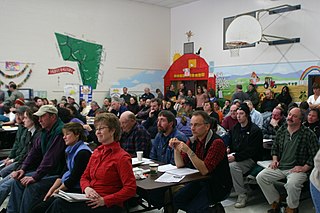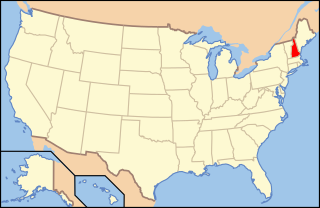
New Hampshire is a state in the New England region of the Northeastern United States. It is bordered by Massachusetts to the south, Vermont to the west, Maine and the Gulf of Maine to the east, and the Canadian province of Quebec to the north. Of the 50 U.S. states, New Hampshire is the fifth smallest by area and the tenth least populous, with a population of 1,377,529 residents as of the 2020 census. Concord is the state capital, while Manchester is the most populous city. New Hampshire's motto, "Live Free or Die", reflects its role in the American Revolutionary War; its nickname, "The Granite State", refers to its extensive granite formations and quarries. It is well known nationwide for holding the first primary in the U.S. presidential election cycle, and for its resulting influence on American electoral politics.

Town meeting, also known as an "open town meeting," is a form of local government in which eligible town residents can directly participate in an assembly which determines the governance of their town. Unlike representative town meeting where only elected representatives can participate in the governing assembly, any town voter may participate in an open town meeting. This form is distinct from town hall meetings held by elected officials to communicate with their constituents, which have no decision-making power.

The Constitution of the State of Texas is the document that establishes the structure and function of the government of the U.S. state of Texas, and enumerates the basic rights of the citizens of Texas.

The Executive Council of the State of New Hampshire is the executive body of the U.S. state of New Hampshire. The Executive Council advises the Governor on all matters and provides a check on the governor's power. While the governor retains the right to veto legislation passed by the New Hampshire General Court, and commands the New Hampshire National Guard, the council has veto power over pardons, contracts with a value greater than $10,000, and nominations. The Executive Council Chambers have been located in the New Hampshire State House since the chambers were added to the capitol in 1909.

The New Hampshire House of Representatives is the lower house in the New Hampshire General Court, the bicameral legislature of the state of New Hampshire. The House of Representatives consists of 400 members coming from 203 legislative districts across the state, created from divisions of the state's counties. On average, each legislator represents about 3,300 residents, which is the smallest lower house representative-to-population ratio in the country.
Massachusetts shares with the five other New England states a governmental structure known as the New England town. Only the southeastern third of the state has functioning county governments; in western, central, and northeastern Massachusetts, traditional county-level government was eliminated in the late 1990s. Generally speaking, there are four kinds of public school districts in Massachusetts: local schools, regional schools, vocational/technical schools, and charter schools.
The Constitution of the State of New Hampshire is the fundamental law of the State of New Hampshire, with which all statute laws must comply. The constitution became effective June 2, 1784, when it replaced the state's constitution of 1776.

The Constitution of the State of Michigan is the governing document of the U.S. state of Michigan. It describes the structure and function of the state's government.

The New Hampshire Senate is the upper house of the New Hampshire General Court, alongside the lower New Hampshire House of Representatives. The Senate has been meeting since 1784. The Senate consists of 24 members representing Senate districts based on population. There are 14 Republicans and 10 Democrats currently serving in the Senate.

The government of Texas operates under the Constitution of Texas and consists of a unitary democratic state government operating under a presidential system that uses the Dillon Rule, as well as governments at the county and municipal levels.

The government of the U.S. State of Oklahoma, established by the Oklahoma Constitution, is a republican democracy modeled after the federal government of the United States. The state government has three branches: the executive, legislative, and judicial. Through a system of separation of powers or "checks and balances," each of these branches has some authority to act on its own, some authority to regulate the other two branches, and has some of its own authority, in turn, regulated by the other branches.
New Hampshire is often noted for its moderate politics and its status as a prominent swing state. Voters predominantly selected Republicans for national office during the 19th and 20th centuries until 1992. Since then, the state has been considered a swing state. Since 2006, control of the state legislature and New Hampshire's congressional seats have switched back and forth between Republicans and Democrats. Although the state has voted for the Democratic candidate in the last four presidential elections since 2004, it has done so by relatively small margins.

The structure of the government of South Dakota is based on that of the federal government, with three branches of government: executive, legislative, and judicial. The structure of the state government is laid out in the Constitution of South Dakota, the highest law in the state. The constitution may be amended either by a majority vote of both houses of the legislature, or by voter initiative.

Lesbian, gay, bisexual, and transgender (LGBT) persons in the U.S. state of New Hampshire enjoy the same rights as non-LGBT residents, with most advances in LGBT rights occurring in the state within the past two decades. Same-sex sexual activity is legal in New Hampshire, and the state began offering same-sex couples the option of forming a civil union on January 1, 2008. Civil unions offered most of the same protections as marriages with respect to state law, but not the federal benefits of marriage. Same-sex marriage in New Hampshire has been legally allowed since January 1, 2010, and one year later New Hampshire's civil unions expired, with all such unions converted to marriages. New Hampshire law has also protected against discrimination based on sexual orientation since 1998 and gender identity since 2018. Additionally, a conversion therapy ban on minors became effective in the state in January 2019. Effective from January 1, 2024, the archaic common-law "gay panic defence" will formally be abolished - by legislation implemented within August 2023.

Elections in the U.S. state of New Hampshire are held at national, state and local level. The state holds the first presidential primary in the national cycle. Elections for a range of state positions coincide with biennial elections for the House of Representatives.

The government of Vermont is a republican form of government modeled after the Government of the United States. The Constitution of Vermont is the supreme law of the state, followed by the Vermont Statutes. This is roughly analogous to the Federal United States Constitution, United States Code and Code of Federal Regulations respectively. Provision is made for the following frame of government under the Constitution of the State of Vermont: the executive branch, the legislative branch, and the judicial branch. All members of the executive and legislative branch serve two-year terms including the governor and senators. There are no term limits for any office.
The Commonwealth of Massachusetts is governed by a set of political tenets laid down in its state constitution. Legislative power is held by the bicameral General Court, which is composed of the Senate and House of Representatives. The governor exercises executive power with other independently elected officers: the Attorney General, Secretary of the Commonwealth, and Auditor. The state's judicial power rests in the Supreme Judicial Court, which manages its court system. Cities and towns act through local governmental bodies to the extent that they are authorized by the Commonwealth on local issues, including limited home-rule authority. Although most county governments were abolished during the 1990s and 2000s, a handful remain.

South Carolina government and politics covers the three different branches of government, as well as the state constitution, law enforcement agencies, federal representation, state finances, and state taxes. South Carolina is a state in the United States of America and was the eighth admitted to the Union. The state of South Carolina was preceded by the Crown Colony of South Carolina, a constitutional monarchy which was overthrown during the American Revolution. Presently, South Carolina's government is formed as a representative democracy.
Charles W. Morse is an American politician who served as president of the New Hampshire Senate and was acting governor of New Hampshire in 2017. Morse represented New Hampshire's 22nd State Senate district from 2010 to 2022, having previously held the same office from 2002 to 2006.

Louis Frank Edelblut is an American businessman and politician who is the Commissioner of the New Hampshire Department of Education. Edelblut formerly served as a Republican member of the New Hampshire House of Representatives. During his term in the House, Edelblut represented Hillsborough County District 38, including the towns of Antrim, Bennington, Francestown, Greenville, Greenfield, Hancock, Hillsborough, Lyndeborough, Wilton, and Windsor. He served on the Finance Committee, Special Committee on Pensions, and the Child and Family Law Committee. He was a Republican candidate for Governor of New Hampshire in 2016, narrowly finishing second in the primary.














